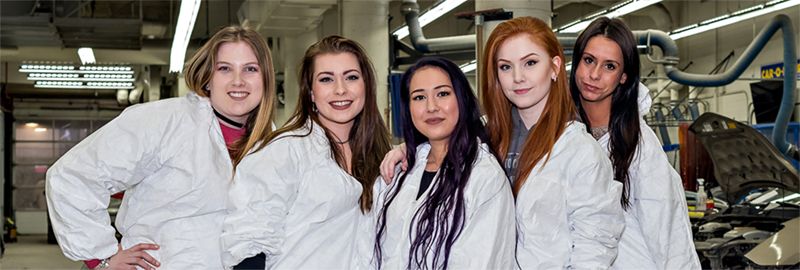Scheduled power outage at Broadway campus, Dec. 13 - 14

On their first day of school in Vancouver Community College’s (VCC) automotive refinishing technician program, Meghan Kelsi, Aleah Simensen, Lydia Terry, Jolene Orr, and Jessica Jensen (pictured, left to right) each fully expected to be the only woman in the room.
Instead, there were five. “It was weird, all these women just kept funneling in!” says Jolene, 23, who came to VCC for her apprenticeship training, after already earning an auto body certificate from a private facility.
“I walked in and was like, yeah ladies!” says Aleah, 19, who already had five years' experiece working in a friend's auto body shop, and always knew this career was for her.
While this cohort may seem unique today (women represent only 4.5 per cent of Canada’s trades workforce), many colleges, government bodies, and industries are hoping to radically increase the number of women in trades in the near future.
One recent effort by the B.C. government is its Women in Trades labour market project, through which it worked with industry partners to identify barriers like bullying and harassment that prevent women from entering or staying in trades careers. It also offers solutions for improving workplace culture and increasing mentorship opportunities.
Do women already succeeding in trades think such initiatives are needed? VCC’s auto refinishing techs say yes.
Meghan, 24, started automotive trades training while still in high school and graduated at the top of her class. She was nearly finished her third year of an automotive service technician apprenticeship when she decided her work environment was simply too hostile and switched into refinishing. “It’s easy to get jobs, but getting taken seriously and treated humanely—that’s a different story,” she says.
Regarding the government project, Meghan believes it’s something that should have been done 50 years ago, but is glad it's happening now. The others agree, each sharing workplace stories ranging from getting ignored or stared at inappropriatel to being outright told that she belongs ‘in the kitchen.’
Lydia, 18, admits to having her work scrutinized more often than she’d like, but wonders if her age may invite more criticism than her gender. “I’m inexperienced, fresh out of high school,” she says. “I really don’t like to think it’s because I’m a girl.”
None of these issues is clear-cut, and women debate amongst themselves as well. How much of it is only generational? When exactly does joking around cross the line? Would a gay man have the same problems?
The women do agree that the work environment in trades can be tough for anyone. “You have to have a pretty thick skin, whether you’re a woman or a man. It’s how the trades are,” says Aleah.
It’s how they are now, anyway, and these women are prepared for it, but they also see change on the horizon. With a younger generation gradually taking over, they’re already noticing more acceptance and respect in the shop, and it’s at VCC where they see it most of all.
“I was extremely nervous to come here after what I’d been through,” says Meghan, “but they’re so good.”
At VCC, these five women say they’re treated like any other student, even regarded for their previous industry experience. They’ve had instructors support them in the classroom, intercede for them in the workplace, and they've made lifelong friends.
Above all, they love what they do. Refinishing and painting are highly suited to individuals who are aesthetically minded, creative, and detail-oriented. Many of these women's hobbies include makeup, drawing, or painting—all of which translated extremely well into the trade.
For all their experiences, these women would also still recommend an automotive refinishing career to any girl who was interested. Their advice is to start early, take advantage of high school programs where possible, talk to other women in trades, and stand up for yourself in general.
“If you’re unhappy and you don’t wake up every day excited to go to work, don’t go!” says Aleah.
“Yeah make a change,” says Meghan. “Your toolbox has wheels on it for a reason.”